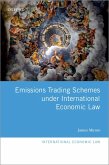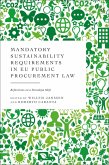Over the last four decades emissions trading has enjoyed a high profile in environmental law scholarship and in environmental law and policy. Much of the discussion is promotional, preferring emissions trading above other regulatory strategies without, however, engaging with legal complexities embedded in conceptualising, scrutinising and managing emissions trading regimes. The combined effect of these debates is to create a perception that emissions trading is a straightforward regulatory strategy, imposable across various jurisdictions and environmental settings. This book shows that this view is problematic for at least two reasons. First, emissions trading responds to distinct environmental and non-environmental goals, including creating profit-centres, substituting bureaucratic control of resources, and ensuring regulatory compliance. This is important, as the particular purpose entrusted to a given emissions trading regime has, as its corollary, a particular governance structure, according to which the regime may be constructed and managed, and which trusts the emissions market, the state and rights in emissions allowances with distinct roles. Second, the governance structures of emissions trading regimes are culture-specific, which is a significant reminder of the importance of law in understanding not only how emissions trading schemes function but also what meaning is given to them as regulatory strategies. This is shown by deconstructing emissions trading discourses: that is, by inquiring into the assumptions about emissions trading, as featuring in emissions trading scholarship and in debates involving law and policymakers and the judiciary at the EU level. Ultimately, this book makes a strong argument for reconfiguring the common understanding of emissions trading schemes as regulatory strategies, and sets out a framework for analysis to sustain that reconfiguration.
Bitte wählen Sie Ihr Anliegen aus.
Rechnungen
Retourenschein anfordern
Bestellstatus
Storno









